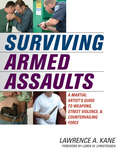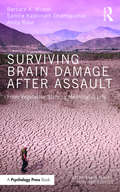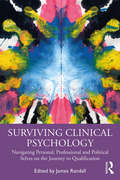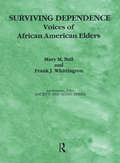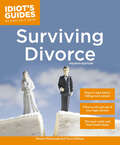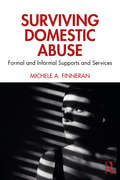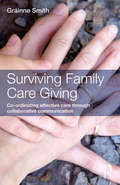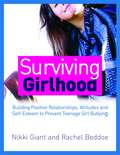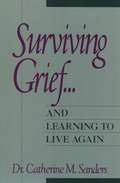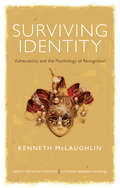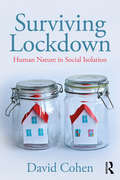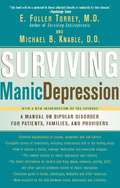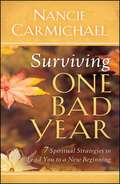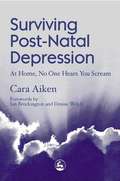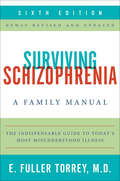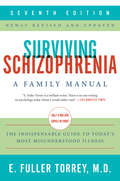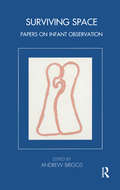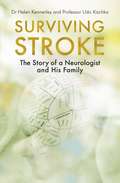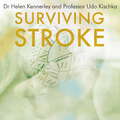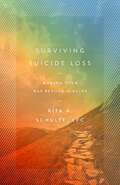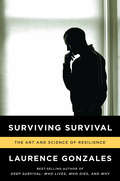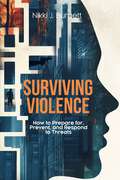- Table View
- List View
Surviving Armed Assaults: A Martial Artists Guide to Weapons, Street Violence, and Countervailing Force
by Lawrence A. KaneFair Fight? Not likely. Least of all from a criminal who is looking to make a quick profit at your expense. A sad fact is that weapon-wielding thugs victimize 1,773,000 citizens every year in the United States alone. Even martial artists are not immune from this deadly threat. Consequently, self-defense training that does not consider the very real possibility of an armed attack is dangerously incomplete. Whether you live in the city or countryside, you should be both mentally and physically prepared to deal with an unprovoked armed assault at any time. Preparation must be comprehensive enough to account for the plethora of pointy objects, blunt instruments, explosive devices, and deadly projectiles that someday could be used against you. This extensive book teaches proven survival skills that can keep you safe on the street. A multitude of real-life scenarios and case studies analyzing violent encounters will help you to internalize this crucial knowledge. Contents include: * Awareness * Avoidance * De-escalation * Countervailing force * Armed conflict * Managing the aftermath of violence * Weapon features and functions If you are serious about self-defense this book is for you. Everyone, including experienced martial artists, security and law enforcement professionals, and concerned citizens will benefit from this vital information.
Surviving Brain Damage After Assault: From Vegetative State to Meaningful Life (After Brain Injury: Survivor Stories)
by Barbara A. Wilson Samira Kashinath Dhamapurkar Anita RoseAt the age of twenty eight Gary was assaulted by a gang with baseball bats and a hammer, resulting in several skull fractures and severe brain damage. For nineteen months he had little awareness of his surroundings before he started to show some recovery. This inspirational book documents his exceptional journey. The book presents a series of interviews with Gary, his mother Wendie, who never gave up, the medical team who initially treated him, and the therapists who worked with him over a period of three years. Through their testimony we learn about the devastating effects which can follow a serious assault to the head, and the long process of recovery over several years. With specialist rehabilitation and continuing family support Gary has exceeded expectations and, apart from some minor physical problems, he is now a normal young man. Surviving Brain Damage after Assault shows that, contrary to popular belief, considerable gains can be made by people who have experienced a long period of reduced consciousness. The book will be of great value to all professionals working in rehabilitation - psychologists, speech and language therapists, occupational therapists, social workers and rehabilitation doctors, and to people who have sustained a brain injury and their families.
Surviving Clinical Psychology: Navigating Personal, Professional and Political Selves on the Journey to Qualification
by James RandallThis vital new book navigates the personal, professional and political selves on the journey to training in clinical psychology. Readers will be able to explore a range of ways to enrich their practice through a focus on identities and differences, relationships and power within organisations, supervisory contexts, therapeutic conventions and community approaches. This book includes a rich exploration of how we make sense of personal experiences as practitioners, including chapters on self-formulation, personal therapy, and using services. Through critical discussion, practice examples, shared accounts and exercises, individuals are invited to reflect on a range of topical issues in clinical psychology. Voices often marginalised within the profession write side-by-side with those more established in the field, offering a unique perspective on the issues faced in navigating clinical training and the profession more broadly. In coming together, the authors of this book explore what clinical psychology can become. Surviving Clinical Psychology invites those early on in their careers to link ‘the political’ to personal and professional development in a way that is creative, critical and values-based, and will be of interest to pre-qualified psychologists and researchers, and those mentoring early-career practitioners.
Surviving Dependence: Voices of African American Elders (Society and Aging Series)
by Mary M Ball Frank J WhittingtonTo date there has not been a clear look at the home care experience of older African Americans. "Surviving Dependence: Voices of African American Elders" attempts to meet the need for recording and interpreting the ordinary life of elderly African Americans on their own terms, in their own surroundings, and in so far as possible, in their own words. Ball and Whittington's research is unique in two ways: it focuses on older people who are African American and poor, and it describes the viewpoint of care recipients and their relationships with the public programs designed to help them. This book provides an in-depth view of the experiences of these seven frail elders as both care receivers and as active participants in their own care. The two primary themes the significant disabilities that often accompany old age and the tenacious will and ability to cope possessed by our informants are reflected in the title: "Surviving Dependence."
Surviving Divorce, Fourth Edition (Idiot's Guides)
by Pamela Weintraub Terry HillmanDivorce is a complicated, if not messy, process that requires expert information. Beginning with cautionary advice and enabling the reader to be sure divorce is the right answer, the founders of Divorce Central, an online service for the divorced and divorcing, provide all of the answers. This new edition moves right into the 21 strategic steps to planning for divorce and covers everything from finding the best ways to expedite the process, avoid unneeded expenses, handle custody and visitation, deal with emotions, and help children through the conflict.
Surviving Domestic Abuse: Formal and Informal Supports and Services
by Michele A. FinneranSurviving Domestic Abuse examines how formal and informal supports and services can mitigate the damaging, and sometimes fatal, social cost of domestic violence. The book highlights victims’ perceptions of supports and lays a foundation for professionals and family members to effectively assist victims of domestic abuse. The book offers actionable recommendations and multiple-use cases to fill gaps in the understanding of the complexities that exist in domestic violence dynamics. Dr Finneran uses real-life interviews with victims to inform action and intervention for policy, strategy and decision-making for support and service providers including law enforcement, healthcare, social services and employers. Identification of successful supports and services can assist in preventing victims from returning to their abusive relationships, and the author provides real-life examples and a sounding board for the voices of real women who have endured domestic abuse. Spanning the gulf between research and practice, this is the ideal book for a range of professional communities including psychologists, social workers and healthcare professionals, and victims and survivors themselves. It’s also suitable for academics and researchers, and students taking domestic violence treatment and prevention courses.
Surviving Family Care Giving: Co-ordinating effective care through collaborative communication
by Gráinne SmithSurviving Family Care Giving: Co-ordinating effective care through collaborative communication is a practical book for family and other home carers in a variety of situations. Gráinne Smith shows how to provide the most effective coordinated care possible through constructive communication and collaborative care, to support individuals who have long term physical and mental health problems, including conditions from Alzheimers to alchoholism, autism to anorexia, schizophrenia to multiple sclerosis. Written from personal experience as a family carer, Gráinne Smith includes interviews with other carers and service users; and draws on years of working with children and their families in tough times. Chapters such as Challenging Behaviour, Confidentiality, and Motivation illustrate some of the many problems facing carers who support vulnerable individuals. Problems include isolation, feelings of helplessness and uncertainty about what best to do, what to try to avoid and the lack of much needed relevant information and resources to support care-giving. Surviving Family Care Giving vividly illustrates the daily difficulties experienced by care givers who offer long term care and support – and shows how to work through them. It provides suggestions on ways to build both constructive collaborative care and good family teamwork through effective communication, and how to ensure continuing care and support for the person at the centre of all the efforts. This book will be essential reading for family and other carers, including professionals trying to create ongoing continuity of care for their patients outside of treatment and education centres.
Surviving Girlhood: Building Positive Relationships, Attitudes and Self-Esteem to Prevent Teenage Girl Bullying
by Nikki Giant Rachel BeddoeTeenage girls can be mean. Often stemming from poor self-awareness, self-esteem and lack of relationship skills, complex friendship dynamics can be difficult to unravel and bullying can be hard to resolve. Surviving Girlhood provides a unique resource for preventing girl bullying by addressing the root causes and helping girls to be strong, positive individuals. Part 1 covers the facts on girl bullying, how to understand it, and the particular complexity of girls. Part 2 includes over 60 tried-and-tested activities that will help girls understand their needs, values, beliefs and influences as drivers for their behaviour. Through five key themes, from 'Being Me' to 'Conflict Resolution', they will also build self-awareness, self-esteem, and strong relationship skills. This photocopiable resource will be an invaluable tool for teachers, youth workers, counsellors, youth offending teams, behavioural specialists and all those working with girls aged 11--16.
Surviving Girlhood: Building Positive Relationships, Attitudes and Self-Esteem to Prevent Teenage Girl Bullying
by Nikki Giant Rachel BeddoeTeenage girls can be mean. Often stemming from poor self-awareness, self-esteem and lack of relationship skills, complex friendship dynamics can be difficult to unravel and bullying can be hard to resolve.Surviving Girlhood provides a unique resource for preventing girl bullying by addressing the root causes and helping girls to be strong, positive individuals. Part 1 covers the facts on girl bullying, how to understand it, and the particular complexity of girls. Part 2 includes over 60 tried-and-tested activities that will help girls understand their needs, values, beliefs and influences as drivers for their behaviour. Through five key themes, from 'Being Me' to 'Conflict Resolution', they will also build self-awareness, self-esteem, and strong relationship skills.This photocopiable resource will be an invaluable tool for teachers, youth workers, counsellors, youth offending teams, behavioural specialists and all those working with girls aged 11--16.
Surviving Grief ... and Learning to Live Again
by Catherine M. SandersAn insightful, compassionate account of the grieving process that helps us through the pain and isolation experienced with the loss of a loved one. . We′re never really prepared for the loss of someone we love. Thrown into a state of emotional chaos we experience rage, guilt, anxiety, and intense sadness all at once. It′s the oldest story in the world, we tell ourselves -- millions of people have had to cope with this before -- and yet, we always believe that what we are experiencing is unique to us. We feel isolated in our anguish and often ashamed of what we are feeling. A profoundly compassionate and insightful book, Surviving Grief. & Learning to Live Again offers you the support and understanding you need to get you through this difficult time. Written by Dr. Catherine Sanders, a therapist and researcher specializing in bereavement issues and one who has lived through the loss of close family members, it helps you to see that what you are feeling is part of a natural process of readjustment and renewal. According to Dr. Sanders, grieving, like any other natural regenerative process, must be allowed to run its proper course if we are ever to regain our equilibrium and continue on with our lives. To help us better understand the process, she describes the five universal phases of grief: Shock, Awareness of Loss, Conservation and The Need to Withdraw, Healing, and Renewal, and guides us through each. Drawing directly from her own experiences and those of her clients and her research studies, she delves deeply and compassionately into the different experiences of grief, and talks about what it means to lose a mate, a parent, or a child. And she discusses the factors that can have an influence on the grieving process, such as age, gender, and the circumstances surrounding the loved one′s death.
Surviving Identity: Vulnerability and the Psychology of Recognition (Concepts for Critical Psychology)
by Kenneth McLaughlinToday, political claims are increasingly made on the basis of experienced trauma and inherent vulnerability, as evidenced in the growing number of people who identify as a "survivor" of one thing or another, and also in the way in which much political discourse and social policy assumes the vulnerability of the population. This book discusses these developments in relation to the changing focus of social movements, from concerns with economic redistribution, towards campaigns for cultural recognition. As a result of this, the experience of trauma and psychological vulnerability has become a dominant paradigm within which both personal and political grievances are expressed. Combining the psychological, social, and political aspects of the expression of individual distress and political dissent, this book provides a unique analysis of how concepts such as "vulnerability" and "trauma" have become institutionalised within politics and society. It also offers a critical appraisal of the political and personal implications of these developments, and in addition, shows how the institutionalisation of the survivor identity represents a diminished view of the human subject and our capacity to achieve progressive political and individual change. This book will be of interest to researchers, postgraduate and undergraduate students of critical psychology, sociology, social policy, politics, social movements and mental health.
Surviving Lockdown: Human Nature in Social Isolation
by David Cohen2020 has been the year of the virus, and it will not be a mere footnote in history. This book reflects on the unprecedented changes to our lives and the impact on our behaviour as we lived through social isolation during the global COVID-19 pandemic. From sociable creatures of habit, we were forced into a period of uncertainty, restriction and risk, physically separated from families and friends. Packed with guidance and coping strategies for lockdown, this book, authored by top psychologist David Cohen, explores the impact of this widespread quarantine on our relationships, our children, our mental health and our daily lives. Benedictine monks, hermit popes, Dorothy Sayers, Daniel Defoe (who made the isolated Robinson Crusoe a hero), Sigmund Freud and a rabbi’s angry dog are all among the cast of characters as we are taken on a whistle-stop tour through plagues in history and brain science, to the importance of introspection and how to make meaning from lockdown. In his trademark entertaining style, Cohen examines the psychology behind our behaviour during this unusual time to discover what we can learn about human nature, what lessons we can learn for the future – and whether we will apply them.
Surviving Manic Depression: Manual on Bipolar Disorder for Patients, Families, and Providers
by E. Fuller Torrey Michael B. KnableSurviving Manic Depression is the most comprehensive, up-to-date book on the disorder that affects more than two million people in the United States alone. Based on the latest research, it provides detailed coverage of every aspect of the disorder. All aspects of the disease are addressed: symptoms, with many direct descriptions from patients themselves, risk factors, onset and cause, medications (including drugs still in the testing stage), causes, psychotherapy, and rehabilitation and how the disease affects children and adolescents. Here too are discussions of special problems related to manic-depressive disorder, including alcohol and drug abuse, violent behavior, medication noncompliance, suicide, sex, AIDS, and confidentiality. Surviving Manic Depression also includes special features such as a listing of selected websites, videotapes, and other resources.
Surviving One Bad Year
by Nancie CarmichaelSpiritual Strategies for a New Beginning Loss has many names -- divorce, death, illness, bankruptcy, depression, disappointment, betrayal, job loss, and more. And as we experience these losses, we sometimes wonder how we will survive. Whether you are reeling from the blow of an immediate crisis or in need of help to sustain you for the long haul, you will find spiritual strength and practical strategies on every page of this book. Purposefully designed to meet you where you are on any given day of need, this book is divided into two parts: PART 1 offers emergency tactics to help you keep your head above water when a huge wave of pain threatens to pull you under. PART 2 reveals seven strategies to help you navigate the stormy waters and make it safely to a peaceful shore. Some days, all your heart can take in may be one simple thought. At those times, you can easily flip through the pages and find... encouraging Bible verses and inspirational quotes -- set off, centered, and easy to find. At other times, you may need to soak up... practical help and biblical teachings. Or... share in stories of others who have also gone through pain. These are here for you as well. When difficult times come -- and they come to us all -- it helps to know that you are not alone, that you will survive, and that there will be an end to your crisis. This book is dedicated to you, as you find that hope and help to survive your bad year.
Surviving Post-Natal Depression: At Home, No One Hears You Scream
by Cara Aiken Ian F BrockingtonResearch indicates that at least one in ten new mothers experience post-natal depression, yet there is little help available to sufferers. Cara Aiken's book will help them, and the professionals who work with them, to understand this illness. The book tells the stories of ten women from very different backgrounds - including the author - who have suffered post-natal depression. Their stories, told honestly and informally, will be a source of strength and hope for other sufferers. The book will also raise awareness of the illness and the destructive effect it can have on individuals and families. It offers positive suggestions and practical advice, based on personal and professional experience. It is a fresh, honest and positive book which will help professionals to understand post-natal depression and will be an invaluable resource for the many mothers who experience it.
Surviving Schizophrenia, 6th Edition
by E. Fuller TorreyUpdated throughout and filled with all the latest research, the bestselling Surviving Schizophrenia is back, now in its sixth edition.Since its first publication in 1983, Surviving Schizophrenia has become the standard reference book on the disease and has helped thousands of patients, their families, and mental health professionals. In clear language, this much-praised and important book describes the nature, causes, symptoms, treatment, and course of schizophrenia and also explores living with it from both the patient's and the family's point of view. This new, completely updated sixth edition includes the latest research findings on what causes the disease, as well as information about the newest drugs for treatment, and answers the questions most often asked by families, consumers, and providers.
Surviving Schizophrenia, 7th Edition: A Family Manual
by E. Fuller TorreyUpdated throughout and filled with all the latest research, treatment plans, commonly asked questions and more, the bestselling resource on schizophrenia is back—now in its seventh edition.“E. Fuller Torrey is a brilliant writer. There is no one writing on psychology today whom I would rather read.”— Los Angeles TimesSince its first publication in 1983, Surviving Schizophrenia has become the standard reference book on the disease and has helped thousands of patients, their families, and mental health professionals. In clear language, this much-praised and important book describes the nature, causes, symptoms, treatment, and course of schizophrenia and also explores living with it from both the patient's and the family's point of view. This new, completely updated seventh edition includes the latest research findings on what causes the illness, as well as information about the newest drugs for treatment, and answers the questions most often asked by families, consumers, and providers.An indispensable guide for those afflicted by schizophrenia as well those who care for them, Surviving Schizophrenia covers every aspect of the condition and sheds new light on an often-misunderstood illness.
Surviving Space: Papers on Infant Observation (Tavistock Clinic Series)
by Andrew BriggsSurviving Space is a collection of papers on infant observation and related issues by contemporary experts in the field, commemorating the centenary of Esther Bick and the unique contribution she has made to psychoanalytic theory. As part of the prestigious Tavistock Clinic Series, this is an essential addition to this highly-valued and innovative series. Infant observation is crucial to most psychotherapy training, and this work would be of obvious value to those commencing their training, as well as valuable insights for all psychotherapists.
Surviving Stroke: The Story of a Neurologist and His Family
by Helen Kennerley Udo KischkaIn October 2016, Udo Kischka suffered a severe stroke. A large intra-cerebral bleed, a bleed deep in the right side of his brain. He was not a typical stroke patient: Professor Kischka was a neurologist and specialist in stroke rehabilitation. Like all stroke patients, he embarked on a journey of recovery. In his case, it was a re-education in his field of expertise. When he uttered the words, 'This is a life changing event' to his wife a few hours after the stroke, he had no idea just how life changing it would be or that there would be still be a good life to be had. Written by experts on both sides of the fence - a stroke victim who is a stroke specialist, and a psychologist who helps others and now has to help herself and her family - this is a personal and brutally honest story of a family's survival. This accessible and relatable book provides insight and realistic hope about what might lie ahead following a stroke, as well as offering both practical and emotional support.
Surviving Stroke: The Story of a Neurologist and His Family
by Helen Kennerley Udo KischkaIn October 2016, Udo Kischka suffered a severe stroke. A large intra-cerebral bleed, a bleed deep in the right side of his brain. He was not a typical stroke patient: Professor Kischka was a neurologist and specialist in stroke rehabilitation. Like all stroke patients, he embarked on a journey of recovery. In his case, it was a re-education in his field of expertise. When he uttered the words, 'This is a life changing event' to his wife a few hours after the stroke, he had no idea just how life changing it would be or that there would be still be a good life to be had. Written by experts on both sides of the fence - a stroke victim who is a stroke specialist, and a psychologist who helps others and now has to help herself and her family - this is a personal and brutally honest story of a family's survival. This accessible and relatable book provides insight and realistic hope about what might lie ahead following a stroke, as well as offering both practical and emotional support.
Surviving Stroke: The Story of a Neurologist and His Family
by Helen Kennerley Udo KischkaIn October 2016, Udo Kischka suffered a severe stroke. A large intra-cerebral bleed, a bleed deep in the right side of his brain. He was not a typical stroke patient: Professor Kischka was a neurologist and specialist in stroke rehabilitation. Like all stroke patients, he embarked on a journey of recovery. In his case, it was a re-education in his field of expertise. When he uttered the words, 'This is a life changing event' to his wife a few hours after the stroke, he had no idea just how life changing it would be or that there would be still be a good life to be had. Written by experts on both sides of the fence - a stroke victim who is a stroke specialist, and a psychologist who helps others and now has to help herself and her family - this is a personal and brutally honest story of a family's survival. This accessible and relatable book provides insight and realistic hope about what might lie ahead following a stroke, as well as offering both practical and emotional support.
Surviving Suicide Loss: Making Your Way Beyond the Ruins
by Rita A. Schulte, LPCNothing could hurt worse. But even in the darkness . . . there&’s hope.The pain of suicide loss is indescribable. It seems beyond survival. Yet with faith, perseverance, and the tools of brain science, there is a way through. It will take time. It will take struggle. But hope is real, for there are things you can do to make it to the other side.If you are struggling with suicide loss or you need to come alongside someone who is, Rita Schulte wants to help you move forward. As a suicide loss survivor herself, she understands the pain you&’re feeling because she has been there too. Rita, an experienced therapist and expert in traumatic loss, offers a science-based therapy model that also takes into account the role of human spirituality. Chapters in this book include:Making Sense of the Desire to DieThe Mind-Body ConnectionUnfinished BusinessMaking Peace with OurselvesFacing the Dark SideChildren—Living Behind the ShadowThe Time that RemainsWhen it comes to suicide loss, you&’ll never have all the answers. But one thing is certain: there are real pathways to help you heal—body, mind, and spirit.
Surviving Suicide Loss: Making Your Way Beyond the Ruins
by Rita A. Schulte, LPCNothing could hurt worse. But even in the darkness . . . there&’s hope.The pain of suicide loss is indescribable. It seems beyond survival. Yet with faith, perseverance, and the tools of brain science, there is a way through. It will take time. It will take struggle. But hope is real, for there are things you can do to make it to the other side.If you are struggling with suicide loss or you need to come alongside someone who is, Rita Schulte wants to help you move forward. As a suicide loss survivor herself, she understands the pain you&’re feeling because she has been there too. Rita, an experienced therapist and expert in traumatic loss, offers a science-based therapy model that also takes into account the role of human spirituality. Chapters in this book include:Making Sense of the Desire to DieThe Mind-Body ConnectionUnfinished BusinessMaking Peace with OurselvesFacing the Dark SideChildren—Living Behind the ShadowThe Time that RemainsWhen it comes to suicide loss, you&’ll never have all the answers. But one thing is certain: there are real pathways to help you heal—body, mind, and spirit.
Surviving Survival: The Art and Science of Resilience
by Laurence GonzalesYou have survived the crisis--trauma, disease, accident, or war--now how do you get your life back? The shark attacked while she was snorkeling, tearing through Micki Glenn's breast and shredding her right arm. Her husband, a surgeon, saved her life on the spot, but when she was safely home she couldn't just go on with her life. She had entered an even more profound survival journey: the aftermath. The survival experience changes everything because it invalidates all your previous adaptations, and the old rules don't apply. In some cases survivors suffer more in the aftermath than they did during the actual crisis. In all cases, they have to work hard to reinvent themselves. Drawing on gripping cases across a wide range of life-threatening experiences, Laurence Gonzales fashions a compelling argument about fear, courage, and the adaptability of the human spirit. Micki Glenn was later moved to say: "I don't regret that this happened to me. [It] has been . . . probably the single most positive experience I've ever had."
Surviving Violence: How to Prepare for, Prevent, and Respond to Threats
by Nikki BurgettViolence can strike without warning--will you be ready? This guide empowers you to stay prepared, proactive, and in control. Combining expert insights with real-world examples, it goes beyond survival tactics to help you master your instincts, sharpen you
